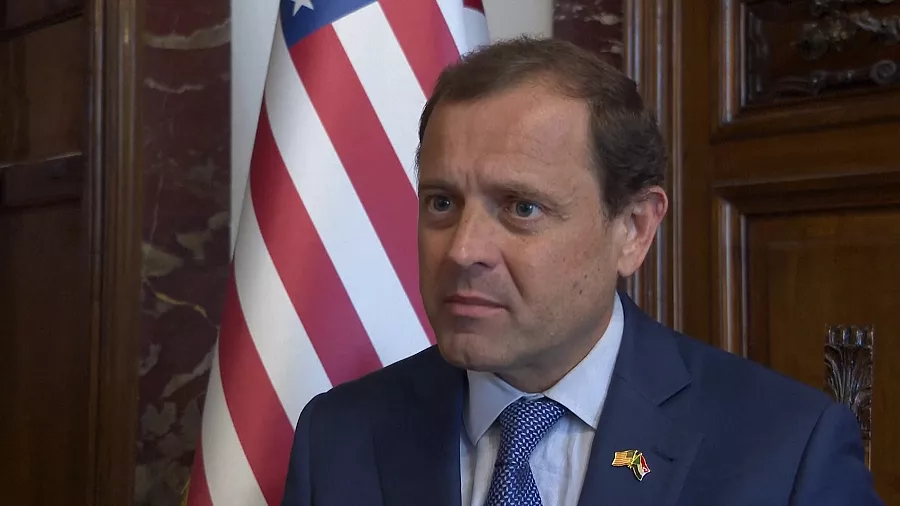US Envoy Criticizes Lack of Political Will to End Sudan’s War
4 min read
The U.S. special envoy for Sudan, Tom Perriello, expressed grave concerns on Thursday about the lack of political will from the warring parties in Sudan to resolve the ongoing conflict. Perriello’s comments came shortly after his first visit to Sudan since assuming the role in February, where he met with officials, including General Abdel Fattah Burhan, the head of Sudan’s military. The conflict in Sudan, which erupted in April 2023, has resulted in tens of thousands of deaths and displaced millions, leading to a dire humanitarian crisis.
Perriello emphasized that despite multiple attempts to broker peace, including U.S.-mediated talks, there has been no substantial progress toward ending the fighting. The war broke out after longstanding tensions between Sudan’s military and paramilitary leaders escalated into open conflict. The rivalry between Burhan’s Sudanese military and General Mohammed Hamdan Dagalo’s Rapid Support Forces (RSF) has since spread across the country, including to western Darfur, and continues to fuel violence.
Speaking from Rome, Perriello told The Associated Press that he did not observe enough “political appetite” from either side of the conflict to seek a peaceful resolution. The U.S. envoy pointed out that any lasting solution must involve returning control of the country to its people, which would require both sides to agree to a ceasefire and begin the difficult work of reconciliation.
Sudan’s efforts to transition to democracy were abruptly halted in 2021 when Burhan and Dagalo orchestrated a military coup, overturning the civilian government established after the 2019 uprising that ousted longtime dictator Omar al-Bashir. The two military leaders, once allies, have now turned against each other, igniting a brutal conflict that has destabilized the country.
Since the war began in April 2023, the UN estimates that over 20,000 people have been killed, and around 14 million people—roughly 30% of Sudan’s population—have been forcibly displaced. Many of these refugees have fled to neighboring countries, exacerbating what the UN calls one of the world’s worst displacement crises. Additionally, more than 26.5 million people in Sudan face acute hunger, with the nation teetering on the brink of famine.
Perriello expressed the immense scale of human suffering in Sudan, calling the numbers “astronomical” and highlighting the atrocities committed by both sides, especially the RSF. He noted horrific abuses in Gezira state, southeast of the capital, Khartoum, where the RSF has been accused of targeting women and children, committing mass killings, and perpetrating other violent acts against civilians.
During his visit to Sudan, Perriello met with civil society groups and humanitarian aid workers to discuss improving the delivery of food and medical supplies to those in need. The U.S. has also focused on stopping the flow of weapons to the warring parties, despite a UN arms embargo. Sudan’s ruling Sovereign Council, led by Burhan, has accused the United Arab Emirates (UAE) of arming the RSF, a claim that the UAE denies, though a UN panel of experts has found the accusation credible. Additionally, the RSF has reportedly received assistance from Russia’s Wagner mercenary group.
In an interview, Perriello stressed that the U.S. has made it clear to countries around the world that they should stop fueling the conflict by supplying weapons to the warring factions. He lamented the involvement of foreign nations in Sudan’s crisis, which he argued is driven by geopolitical interests rather than concern for the Sudanese people. He pointed out that many countries have prioritized sending arms over sending much-needed humanitarian aid.
Burhan, who has aligned himself with Russia and Egypt, has also sought military support from Tehran, with reports suggesting that Sudan’s government forces may have purchased drones from Iran. Perriello’s criticism was sharp, stating that it is “absurd” that so many countries are sending weapons to Sudan instead of food and medicine, which the country desperately needs.
Perriello, who has worked in conflict zones like the Democratic Republic of the Congo, Afghanistan, and Sierra Leone, said that the scale of the crisis in Sudan is unprecedented in his career, and the lack of international attention is deeply troubling. Despite the severity of the situation, the international community has not responded with the urgency and focus that Perriello believes is necessary to address the crisis and prevent further suffering.
As Sudan continues to endure the devastating effects of this conflict, the U.S. special envoy’s remarks underscore the urgency of finding a political solution that addresses the root causes of the war, ensures accountability for atrocities, and restores stability to the country. With no clear end in sight to the fighting, the path forward remains uncertain, and the humanitarian situation is expected to worsen unless substantial international efforts are made to pressure the warring factions to negotiate peace.






